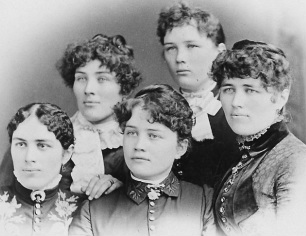
A group of people who had been denied basic rights enjoyed by others approached the highest court in the land. Thousands of years of tradition stood against them. They were opposed by powerful interests that saw their cause as a threat. On their side, they had only the righteousness of their cause and the truth of their arguments. When their pleas for justice were heard, the honest sensibility of their position was so incontrovertible that the halls of power could not deny them. They won fair treatment that put them on the path toward freedom and equality.
That is this week's story, both in the news and in the Torah. It is the story of the U.S. Supreme Court restoring equal marriage in California and ruling that the federal government must recognize all legal marriages equally — those of same-sex couples the same as those of straight couples. It is also the story of the daughters of Zelophechad in this week's Torah portion (Pinchas).
The Torah recounts how the five daughters of Zelophechad — Machlah, Noah, Choglah, Milkah and Tirzah — approached Moses after the death of their father. In front of all the elders of Israel, they explained that their father had no sons to carry on his name and inherit his land. Since women were not permitted to inherit, his name would be lost and his land holdings would be absorbed by others. They asked, given these circumstances, that they receive the right to inherit.
Traditionally, this is considered one of the four incidents in which Moses had to consult with God in order to answer a legal question (Sifre Shelach 113). Moses brought the case of the five sisters to God and God told Moses, "The plea of Zelophechad’s daughters is just. You should give them a hereditary holding among their father’s kin. Transfer their father’s share to them" (Numbers 27:7). In addition, God instructed Moses that this rule would apply any time a man died without a son. His daughters would be allowed to inherit.
In the context of the time, this was a great victory for justice. But was the victory of the daughter's of Zelophechad complete? No. They won the right to inherit, but only when there were no sons to inherit ahead of them. It took many centuries more for any human society to reach the point where men and women would be be accorded equal property rights. It was not a complete victory, but an important milestone on the way toward equality.
The same is true of Wednesday's victories in the Supreme Court. It was a great victory, but not a complete one. Two thirds of Americans still live in states that do not accord equal marriage rights to all of their citizens (and I am one of them). There is still a great deal of work left to do in the cause of justice.
We Americans are proud to live in a country that values liberty and freedom as much as we do. Sometimes, we assume that freedom comes as easily as breathing in our country — as if it were part of our society's culture and DNA. We forget that there are many Americans whose freedom is denied by persistent forms of discrimination. If some adult Americans do not have the right to marry the person they love, no matter what state they live in, we have not yet reached the full promise of being a free country.
We also forget that winning freedom is not easy. Like the thousands of American men and women who have spoken up for equal marriage, the daughter's of Zelophechad did not sit in their tents waiting for justice to be delivered to them. They did not despair that the obstacles were too great, or that they had to accept inequality. They gathered their courage to stand in front of powerful men to ask for something no woman had received before. They made their case in such a powerful way that not even the mighty could deny the truth of a God who loves justice. They won because they dared to speak up and to fight for what they believed.
Tell me if this story sounds familiar to you. The task is not yet complete. There is so much more we need to do to create the society of our dreams. Keep standing up and speaking out for justice.
Other Posts on This Topic:
DOMA, the Supreme Court, and Love
Pinchas: Five Sisters Who Turned the Key to Unlock the Torah
Life's Do-Overs



 RSS Feed
RSS Feed
